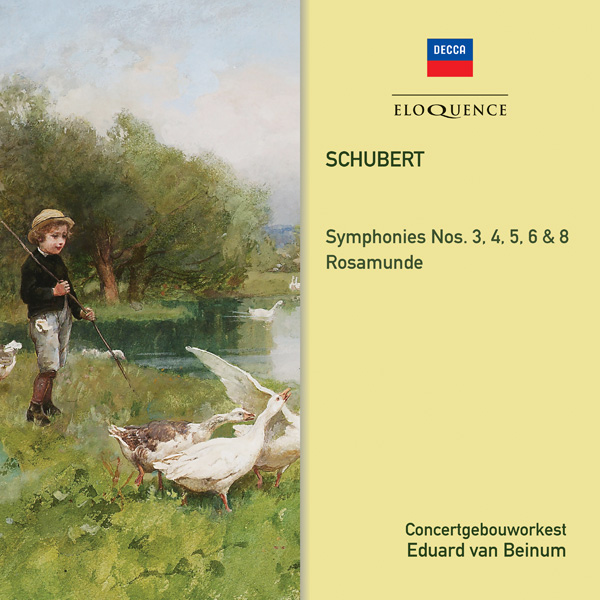The name of Eduard van Beinum may too often be overlooked among the music directors of Amsterdam’s Royal Concertgebouw Orchestra, in between the longer and more internationally renowned tenures of Willem Mengelberg and Bernard Haitink. But this is a wrong that Eloquence has put to right with the reissue of the greater portion of Van Beinum’s recorded work with the orchestra on both Decca and Philips. The conductor has been revealed anew as an interpreter of lucidly-phrased fidelity to the score and uncommon sensitivity.
The present issue brings repertoire especially close to Van Beinum’s heart. He was a master Schubertian who needed to be taught no lessons by the nascent period-instrument movement on nurturing a hop, skip and jump in the composer’s effervescent orchestral textures or coaxing a sweetly flowing lyricism from their sunny complexions.
The newly written booklet appreciation of Van Beinum by Niek Nelissen looks to his roots in a farming family for his particular sympathy with the composer: his colleague and former artistic director of the Concertgebouw remembered his aversion ‘to anything that was unnatural or artificial; [he] looked for the most natural way in everything. In his conducting, he aimed for the same simplicity and lack of affectation that attracted him in the music he loved most.’
Ranging from the late mono to the early stereo era, the recordings begin with a driven and thrilling Fifth Symphony from September 1946: one of the first postwar recordings made by Decca with the orchestra. In fact, fleet tempi mark out all these recordings from most of their contemporaries as does the inclusion of many repeats. The Third (1955) and Sixth (1957) are particular highlights: in the last five years of his life, Van Beinum conducted these more frequently than any symphony by Beethoven. Even the ‘Unfinished’ (also from 1957) is full of pathos but unburdened by anachronistically Romantic weight and sentiment, stylistically some years ahead of its time.
This generously filled twofer is completed by 1952 recordings of the Fourth Symphony and incidental music from ‘Rosamunde’ both masterminded at the control desk by the legendary Decca producer, John Culshaw.
FRANZ SCHUBERT
CD 1
Symphony No. 4 in C minor, D.417 ‘Tragic’*
Symphony No. 5 in B flat major, D.485*
Rosamunde, D.797 – Incidental music (excerpts)*
CD 2
Symphony No. 3 in D major, D.200
Symphony No. 6 in C major, D.589 ‘The Little’
Symphony No. 8 in B minor, D.759 ‘Unfinished’
Concertgebouworkest
Eduard van Beinum
*FIRST CD RELEASE ON DECCA
Recording Producers: John Culshaw (Symphony No. 4, Rosamunde); Victor Olof (Symphony No. 5); Jaap van Ginneken (Symphonies Nos. 3, 6, 8)
Balance Engineers: Kenneth Wilkinson (Symphony No. 4, Symphony No. 5, Rosamunde); Henk Jansen, Hans Lauterslager, Cees Huizinga (Symphony No. 3); Henk Jansen, Cees Huizinga (Symphonies Nos. 6, 8)
Recording Location: Grote Zaal, Concertgebouw, Amsterdam, The Netherlands, 17 September 1946 (Symphony No. 5), May 1952 (Rosamunde), November–December 1952 (Symphony No. 4), 6–9 June 1955 (Symphony No. 3), 22–25 May 1957 (Symphony Nos. 6, 8)
Original LP Releases: Decca LX 3082 (Symphony No. 5); LXT 2779 (Symphony No. 4); Decca LXT 2770 (Rosamunde); Philips A00294/5L (Symphony No. 3); Philips A00442L (Symphony Nos. 6, 8)
‘The performance is an entirely exhilarating one… a very fine version of the Symphony indeed.’ (No.3) Gramophone, March 1956
‘I enjoyed this very much. And that is something to say of yet another new recording of the ‘Unfinished’. Van Beinum is a conductor of whom I don’t normally expect some blinding new revelation but I do always expect from him a thoroughly musical interpretation, faithful to the score and, at the same time, sensitive; and that is what he gives us here.’ (No.8) Gramophone, August 1958
‘Not only is there brio and dash aplenty, there is a daring that other conductors would do well to follow. Van Beinum, for example, has the good sense to ignore Schubert’s moderato specification for the finale of the Sixth Symphony, arid at the conductor’s uncommonly brisk tempo, this often tedious-sounding music becomes transformed into something refreshingly animated … Indeed, the “Unfinished“ offers a blend of soaring lyricism and searing intensity that one rarely encounters and that purges the work of even the slightest hint of sentimentality.’ Fanfare, May/June 1979

